 ★★★★½
★★★★½
“Suckers for punishment?”
 Before getting to the film, what’s perhaps even more interesting is the critical reaction: it has been a long time since I’ve seen a film provoke such savagery, e.g. the Chicago Tribune’s Michael Phillips, who wrote: “The film abdicates so many basic responsibilities of coherent storytelling, even coherent stupid-action-movie storytelling, director/co-writer/co-producer Zack Snyder must have known in preproduction that his greasy collection of near-rape fantasies and violent revenge scenarios disguised as a female-empowerment fairy tale wasn’t going to satisfy anyone but himself.” Ouch. That’s far from the only example, and covers the common planks used to whack Snyder: incoherence, faux-feminism and dubious sexual politics.
Before getting to the film, what’s perhaps even more interesting is the critical reaction: it has been a long time since I’ve seen a film provoke such savagery, e.g. the Chicago Tribune’s Michael Phillips, who wrote: “The film abdicates so many basic responsibilities of coherent storytelling, even coherent stupid-action-movie storytelling, director/co-writer/co-producer Zack Snyder must have known in preproduction that his greasy collection of near-rape fantasies and violent revenge scenarios disguised as a female-empowerment fairy tale wasn’t going to satisfy anyone but himself.” Ouch. That’s far from the only example, and covers the common planks used to whack Snyder: incoherence, faux-feminism and dubious sexual politics.
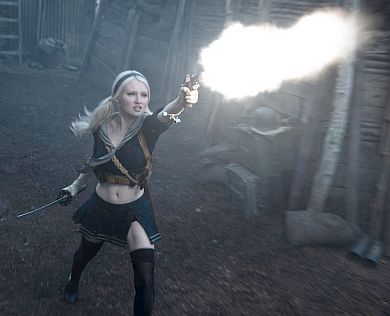 There’s not even any genre love lost. Joe Wright, director of the somewhat similarly-themed Hanna, which came out two weeks after Sucker, tore into it: “I probably shouldn’t say this but the posters for recent films with girls kicking arse – there’s one out at the moment – there’s girls in the poster in bikinis and crop-tops, and they’ve got pigtails and they’re dressed up as schoolgirls. They’re being sexualised, this is supposedly ‘Girl Power’ female empowerment and that’s bullshit. Female empowerment is not about sex, that is the point of female empowerment. It’s about brains and not objectifying women.”
There’s not even any genre love lost. Joe Wright, director of the somewhat similarly-themed Hanna, which came out two weeks after Sucker, tore into it: “I probably shouldn’t say this but the posters for recent films with girls kicking arse – there’s one out at the moment – there’s girls in the poster in bikinis and crop-tops, and they’ve got pigtails and they’re dressed up as schoolgirls. They’re being sexualised, this is supposedly ‘Girl Power’ female empowerment and that’s bullshit. Female empowerment is not about sex, that is the point of female empowerment. It’s about brains and not objectifying women.”
It’s worth pointing out Wright hadn’t seen the film, but I can’t say I support his position of laying down canon law on what does or does not constitute “the point of female empowerment”, or accept that sex is incompatible with it, as he states. There’s multiple routes to the goal, just as the Camille Paglia approach to feminism differs from the Andrea Dworkin one. It’s not a Spandex leotard – one size fits all – and to denigrate another piece of entertainment (which is, after all, what both Hanna and Sucker Punch are) for an alternative approach seems petty and mean-spirited. There’s room in the playground for both. Of course, I’m not someone who relies upon Hollywood to provide any kind of moral compass: if you do, I’d say you have far bigger problems than Sucker Punch.
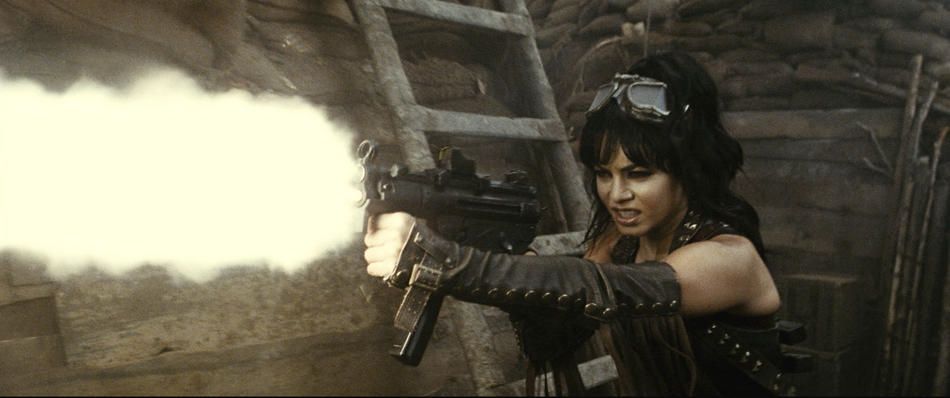 But those who like it, really like it. It’s rated at 6.6 on the IMDB, from over 25,000 votes, so it’s not just studio shills. Compare other critically-savaged and commercial genre “failures”: Barb Wire (3.1), Catwoman (3.2), Ultraviolet (4.0). Sucker is more in line with something like Underworld (6.8), and the reaction on Twitter is also far more positive. Star Cornish may have a point when she said, “It’s so stylised, so specific; there’s no other film like it at all. When you have something totally new, it’s going to be judged to the 10th degree… When you’ve got a totally new concept, it’s a love or hate relationship.”
But those who like it, really like it. It’s rated at 6.6 on the IMDB, from over 25,000 votes, so it’s not just studio shills. Compare other critically-savaged and commercial genre “failures”: Barb Wire (3.1), Catwoman (3.2), Ultraviolet (4.0). Sucker is more in line with something like Underworld (6.8), and the reaction on Twitter is also far more positive. Star Cornish may have a point when she said, “It’s so stylised, so specific; there’s no other film like it at all. When you have something totally new, it’s going to be judged to the 10th degree… When you’ve got a totally new concept, it’s a love or hate relationship.”
That’s not necessarily a bad thing. Even if it fails, I’d rather have a film with ambitions, that tries something different, rather than another Judd Apatow/Seth Rogen “comedy”. There’s some parallel to be drawn between Snyder and Dutch maverick Paul Verhoeven. You could link Snyder’s Dawn of the Dead remake to Robocop, while 300 and Starship Troopers are both pseudo-fascistic tributes to the glory of war – and Sucker Punch would be Snyder’s Showgirls, a critically-reviled flop, damaged by its rating. Except here, it’s the PG-13 which hurts, but we’ll get more into that a little later.
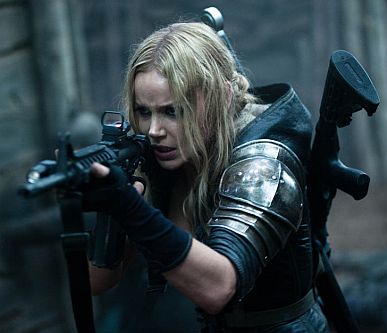 The movie itself is imperfect; by some measures perhaps not even the “best” GWG film I’ve seen at the cinema this month. However, it is thoroughly cinematic and can only be admired as such – I’m far more likely to pick up the Blu-Ray DVD of this than Hanna. An un-named 20-year old (Browning) is sent to a lunatic asylum by her stepfather, after rejecting his attentions and being made the scapegoat for the death of her younger sister; her lobotomy is scheduled for five days time. Turns out the asylum is a high-end brothel where our heroine – nick-named “Baby Doll” – and the other girls are kept to perform for the pleasure of various high-rollers. Baby Doll plots an escape, the tools necessary lifted by her accomplices while she entrances the staff and customers with her dancing. During these, Baby Doll retreats even further, to fantasy worlds to do battle against dragons, robots, samurai warriors, etc. But which “reality” is real?
The movie itself is imperfect; by some measures perhaps not even the “best” GWG film I’ve seen at the cinema this month. However, it is thoroughly cinematic and can only be admired as such – I’m far more likely to pick up the Blu-Ray DVD of this than Hanna. An un-named 20-year old (Browning) is sent to a lunatic asylum by her stepfather, after rejecting his attentions and being made the scapegoat for the death of her younger sister; her lobotomy is scheduled for five days time. Turns out the asylum is a high-end brothel where our heroine – nick-named “Baby Doll” – and the other girls are kept to perform for the pleasure of various high-rollers. Baby Doll plots an escape, the tools necessary lifted by her accomplices while she entrances the staff and customers with her dancing. During these, Baby Doll retreats even further, to fantasy worlds to do battle against dragons, robots, samurai warriors, etc. But which “reality” is real?
There’s more doubt over that, than which reality Snyder likes: hands-down, it’s the one filled with carnage, and his love for it shows. It’s only April, you could nominate these as the best four action sequences of the year, and I wouldn’t argue. My personal favourite sees the five girls storm the trenches in World War I, taking on steampunk-powered German zombies, with the aid of a rocket-powered walking tank. Remarkably, as cool as that sounds on the page, seeing it on screen is even better. Yes, all bear more than a passing resemblance to video games: they still work, possessing an elegant flow to them. And while none of the heroines will make Zhang Ziyi lose sleep, nor are they left looking horribly out of their depth, a major fear on hearing a High School Musical star was involved.
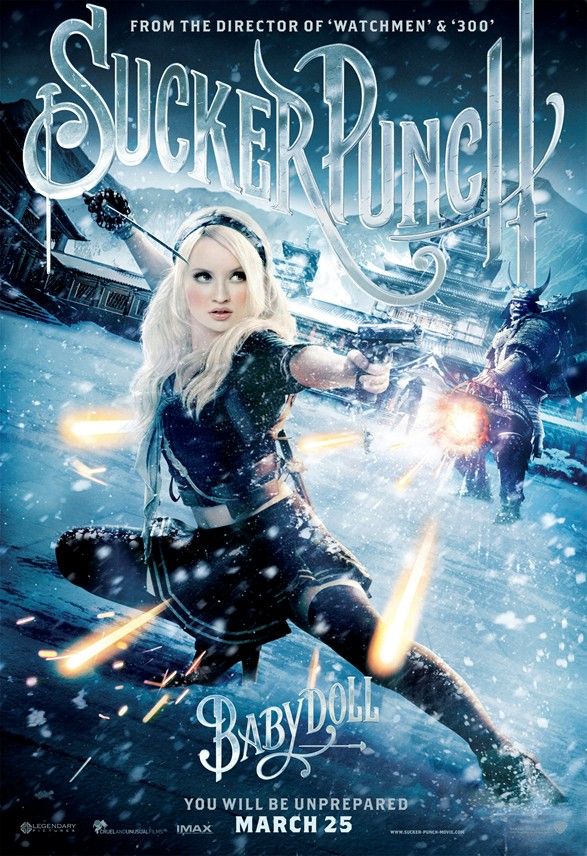 Since Baby Doll is explicitly stated to be 20, this doesn’t strictly fall into the category of “teenage action heroines,” but her hair, clothes, make-up, etc. all are designed to evoke the spirit of what Chris disparagingly called, “schoolgirl porn” – but the PG-13 rating means it can get absolutely no closer, so really, what’s the point? At least Showgirls delivered the goods: Baby Doll’s fantasy world might as well have been an office, college dorm or, frankly, convent, instead of the world’s most demure brothel. Reports indicate it took seven submissions and the removal of 18 minutes to get past the MPAA, so I have to ask. Should a film that, on one level, is about an abused girl forced into prostitution by her step-father, share a rating with Harry Potter And The Goblet Of Fire?
Since Baby Doll is explicitly stated to be 20, this doesn’t strictly fall into the category of “teenage action heroines,” but her hair, clothes, make-up, etc. all are designed to evoke the spirit of what Chris disparagingly called, “schoolgirl porn” – but the PG-13 rating means it can get absolutely no closer, so really, what’s the point? At least Showgirls delivered the goods: Baby Doll’s fantasy world might as well have been an office, college dorm or, frankly, convent, instead of the world’s most demure brothel. Reports indicate it took seven submissions and the removal of 18 minutes to get past the MPAA, so I have to ask. Should a film that, on one level, is about an abused girl forced into prostitution by her step-father, share a rating with Harry Potter And The Goblet Of Fire?
However, I do like a little more plot and better characterization with my action sequences. I think Baby Doll probably sings more than she speaks in the film. Browning is responsible for the cover of Sweet Dreams, which backs the immensely creepy opening that paints, in swift efficient brush strokes, the lead-up to her arrival at the asylum. It’s almost as if Snyder says, “Well, that’s that out of the way,” and there’s nothing anywhere near as effective the rest of the way. The rest of Baby’s posse don’t even get the benefit of that, and remain little more than lingerie-clad chess pieces, to be moved around the board of Snyder’s (undeniably impressive) imagination. Same goes for the plot, which has the action sequences more grafted on, than flowing naturally from the plot.
Overall, however, for all its undeniable flaws, this is a rare beast: an action film where women [rather than a singular woman] take center-stage. I’m hard pushed to think of anything like it out of Hollywood since, perhaps, The Descent, and this is clearly on a much bigger scale. Unfortunately, the luke-warm box-office probably makes it unlikely anyone else will follow suit, though I get the feeling it will do very nicely on DVD. It’s certainly close to a unique movie, for its combination of style, content and execution, and I tend to think/hope that the passage of time will be kinder to it, than most contemporary critics.
Dir: Zack Snyder
Stars: Emily Browning, Abbie Cornish, Jena Malone, Vanessa Hudgens





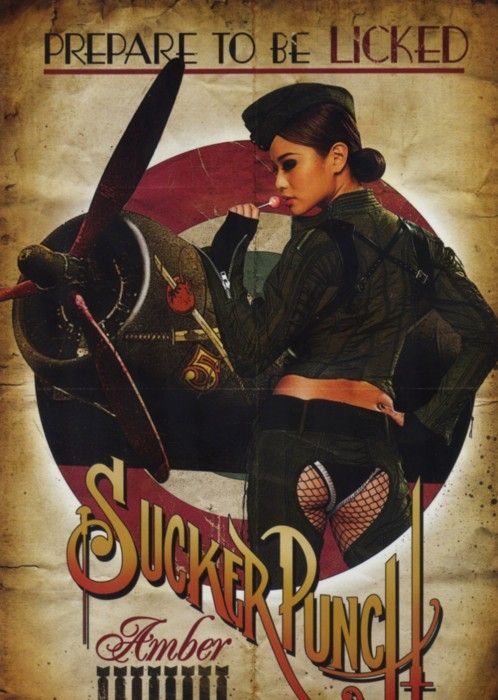
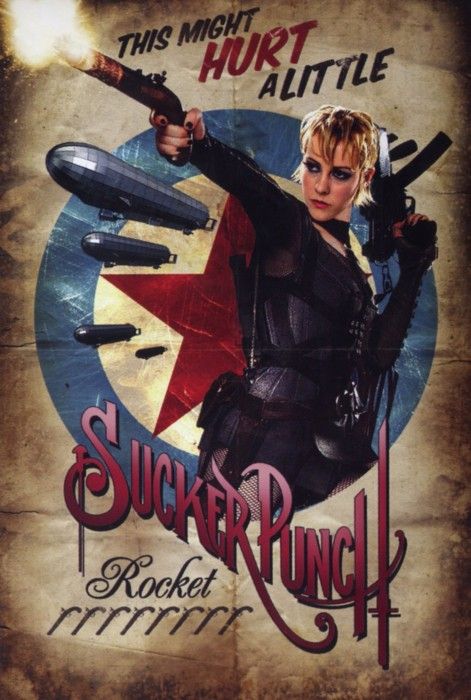
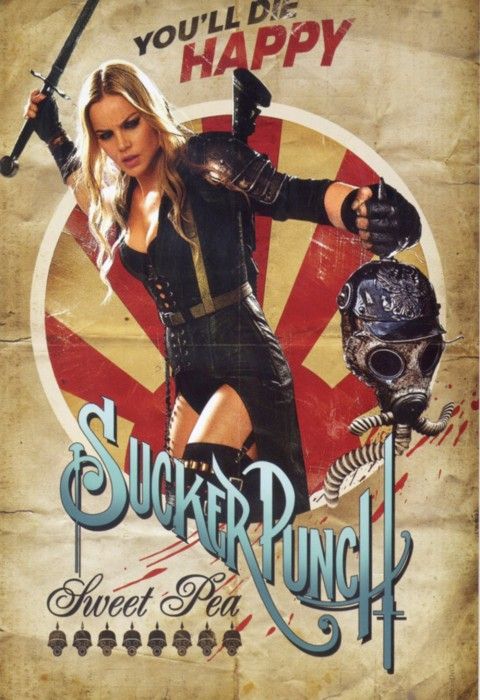
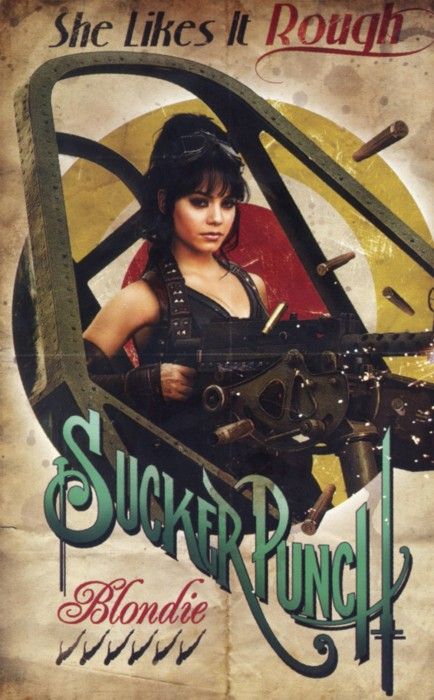
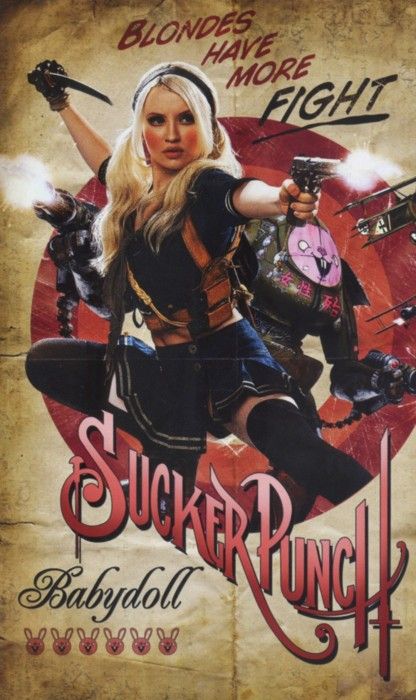





























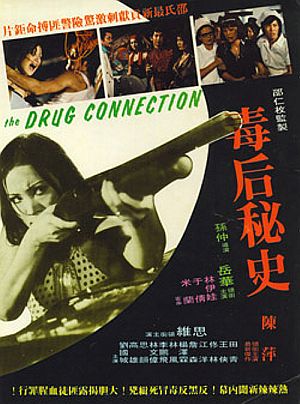 Not to be confused, in any way with SexyKiller, this 1976 Shaw Brothers film is more of an unofficial remake of Coffy. Wanfei (Ping), a nurse by day, decides to go vigilante by night, after her sister falls victim to druglords and ends up brain-damaged and drooling. With most of the police force in the pockets of the dealers, Wanfei opts to go undercover as a drug-addict of loose morals, so she can make her way up the chain of command, to deliver justice on behalf of her sister to the sinister Boss (Hsia). This finds her an ally in Weipin (Hua), a childhood friend and honest cop whose hands are tied by pesky bureaucratic niceties, like “needing a search warrant”; she’s also encouraged by her pundit boyfriend (Wei), who has long taken a strong anti-drug stance.
Not to be confused, in any way with SexyKiller, this 1976 Shaw Brothers film is more of an unofficial remake of Coffy. Wanfei (Ping), a nurse by day, decides to go vigilante by night, after her sister falls victim to druglords and ends up brain-damaged and drooling. With most of the police force in the pockets of the dealers, Wanfei opts to go undercover as a drug-addict of loose morals, so she can make her way up the chain of command, to deliver justice on behalf of her sister to the sinister Boss (Hsia). This finds her an ally in Weipin (Hua), a childhood friend and honest cop whose hands are tied by pesky bureaucratic niceties, like “needing a search warrant”; she’s also encouraged by her pundit boyfriend (Wei), who has long taken a strong anti-drug stance. This 12-part serial from Republic was a spin-off from the success of Zorro – though despite the title, the Z-word is never mentioned. It moves the legend from Spanish California to Idaho in the 1880’s, just before a vote to decide whether it would become a state. Villainous Dan Hammond (McDonald) begins a violent campaign to prevent this, and is opposed by local newspaper owner Randolph Meredith, who has a secret identity as The Black Whip, a masked vigilante. When he is shot dead, his sister Barbara (Stirling) takes up the cape and whip, along with the help of undercover federal agent, Vic Gordon (Lewis). Together, they foil Hammond’s increasingly-desperate plots as voting day nears, and escape from 11 precarious positions. Well, it
This 12-part serial from Republic was a spin-off from the success of Zorro – though despite the title, the Z-word is never mentioned. It moves the legend from Spanish California to Idaho in the 1880’s, just before a vote to decide whether it would become a state. Villainous Dan Hammond (McDonald) begins a violent campaign to prevent this, and is opposed by local newspaper owner Randolph Meredith, who has a secret identity as The Black Whip, a masked vigilante. When he is shot dead, his sister Barbara (Stirling) takes up the cape and whip, along with the help of undercover federal agent, Vic Gordon (Lewis). Together, they foil Hammond’s increasingly-desperate plots as voting day nears, and escape from 11 precarious positions. Well, it  It isn’t
It isn’t 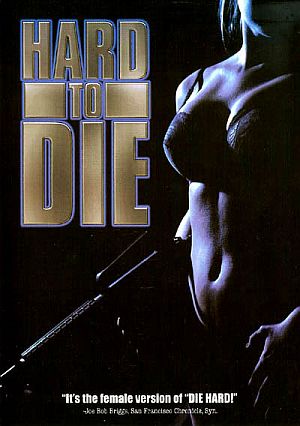 This slice of cheese couldn’t be any riper. Five employees of the Acme Lingerie Company are called in to work on a Saturday to do inventory, despite the presence of creepy janitor Ketchum. A misdelivered package arrives, intended for Dr. Newton, an investigator of witchcraft, and when the ladies open it, they unleash the soul of a serial killer (allowing the use of flashback footage from a previous Wynorski flick. Sorority House Massacre). Meanwhile, the workers, having got all dusty gathering up boxes in the basement, make the logical decision: to take showers and try on the latest Acme line of skimpy products. Which they then wear for the rest of the film. As the unleashed killer picks off them, and everyone else in the building, one by one. Fortunate that there’s an arms dealer who has also set up shop on another floor, and who has left large quantities of merchandise and ammo around…
This slice of cheese couldn’t be any riper. Five employees of the Acme Lingerie Company are called in to work on a Saturday to do inventory, despite the presence of creepy janitor Ketchum. A misdelivered package arrives, intended for Dr. Newton, an investigator of witchcraft, and when the ladies open it, they unleash the soul of a serial killer (allowing the use of flashback footage from a previous Wynorski flick. Sorority House Massacre). Meanwhile, the workers, having got all dusty gathering up boxes in the basement, make the logical decision: to take showers and try on the latest Acme line of skimpy products. Which they then wear for the rest of the film. As the unleashed killer picks off them, and everyone else in the building, one by one. Fortunate that there’s an arms dealer who has also set up shop on another floor, and who has left large quantities of merchandise and ammo around… ★★★★
★★★★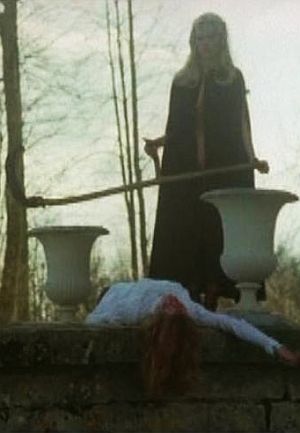 Watching porn stars try to act is often a painful experience, but renowned 70’s XXX starlet Lahaie is perfectly cast here. She plays a feral creature, driven entirely by instinct, and with no qualms about using sex or violence to achieve her aim, of keeping Mark in the house for the night. The sight of her stalking across the bridge which forms the castle’s sole entrance, wielding a blood-stained scythe almost the same size as the actress, is one that will stick with you. The film does betray its cheapness with some fairly crappy effects [you’re going to have someone hacked apart with a scythe, you should do better than some red gunk on the throat], but more than makes up for it with a parade of strong, confident and sensual female characters. Mark is by no means an idiot or a weakling, but from the moment he arrives in the house, it’s clear he’s completely beyond his depth, out-maneouvered at every turn by the women.
Watching porn stars try to act is often a painful experience, but renowned 70’s XXX starlet Lahaie is perfectly cast here. She plays a feral creature, driven entirely by instinct, and with no qualms about using sex or violence to achieve her aim, of keeping Mark in the house for the night. The sight of her stalking across the bridge which forms the castle’s sole entrance, wielding a blood-stained scythe almost the same size as the actress, is one that will stick with you. The film does betray its cheapness with some fairly crappy effects [you’re going to have someone hacked apart with a scythe, you should do better than some red gunk on the throat], but more than makes up for it with a parade of strong, confident and sensual female characters. Mark is by no means an idiot or a weakling, but from the moment he arrives in the house, it’s clear he’s completely beyond his depth, out-maneouvered at every turn by the women.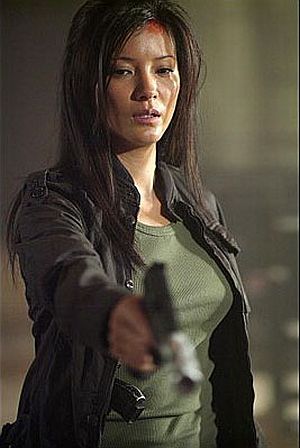 Every seven years, thirty of the world’s greatest assassins gather together for a battle. The winner gets $10 million, while bettors view the action remotely and gamble on the duels, face-offs and bloodbaths which ensue. Each assassin has a tracker implanted, and has a scanner where they can see the location of any other contestants nearby. This time, it’s in Middlesbrough, England, with reigning champion Joshua Harlow (Rhames) returning after he it told the murderer of his wife will be taking part. One of the 30 dumps their tracker into an alcoholic priest (Carlyle), who is “surprised”, shall we say, to become the target for the other 29. Lai Lai Zhen (Hu) realizes he’s an innocent, and vows to protect him, while also trying to win the competition.
Every seven years, thirty of the world’s greatest assassins gather together for a battle. The winner gets $10 million, while bettors view the action remotely and gamble on the duels, face-offs and bloodbaths which ensue. Each assassin has a tracker implanted, and has a scanner where they can see the location of any other contestants nearby. This time, it’s in Middlesbrough, England, with reigning champion Joshua Harlow (Rhames) returning after he it told the murderer of his wife will be taking part. One of the 30 dumps their tracker into an alcoholic priest (Carlyle), who is “surprised”, shall we say, to become the target for the other 29. Lai Lai Zhen (Hu) realizes he’s an innocent, and vows to protect him, while also trying to win the competition.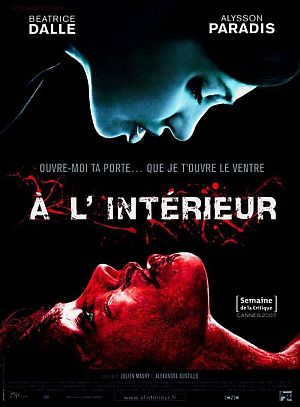
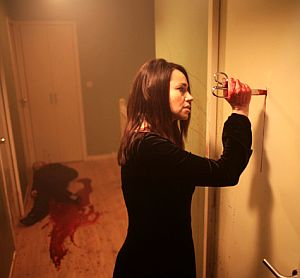 Let me be perfectly clear: this is hardcore horror of the most unrelenting sort, completely unsuitable for those of a nervous disposition, and particularly pregnant women. In the 1980’s, Dalle was a sexpot, for her role in Betty Blue, but you can flush all memory of that down the toilet: here, she has a feral, near-demonic intensity, and god help anyone who is unfortunate enough to get in her way. Particularly the men, who are disposed of with complete dispassion and brutality; as the film goes on, her relationship with Sarah becomes complex, and more a case of, “I’m taking your baby, and we can do this the hard way or… Well, really, that’s all there is. Sorry.” Friends, family, even an entire patrol of cops – no-one can help Sarah. She’s completely on her own, and her fate is entirely in her own hands.
Let me be perfectly clear: this is hardcore horror of the most unrelenting sort, completely unsuitable for those of a nervous disposition, and particularly pregnant women. In the 1980’s, Dalle was a sexpot, for her role in Betty Blue, but you can flush all memory of that down the toilet: here, she has a feral, near-demonic intensity, and god help anyone who is unfortunate enough to get in her way. Particularly the men, who are disposed of with complete dispassion and brutality; as the film goes on, her relationship with Sarah becomes complex, and more a case of, “I’m taking your baby, and we can do this the hard way or… Well, really, that’s all there is. Sorry.” Friends, family, even an entire patrol of cops – no-one can help Sarah. She’s completely on her own, and her fate is entirely in her own hands.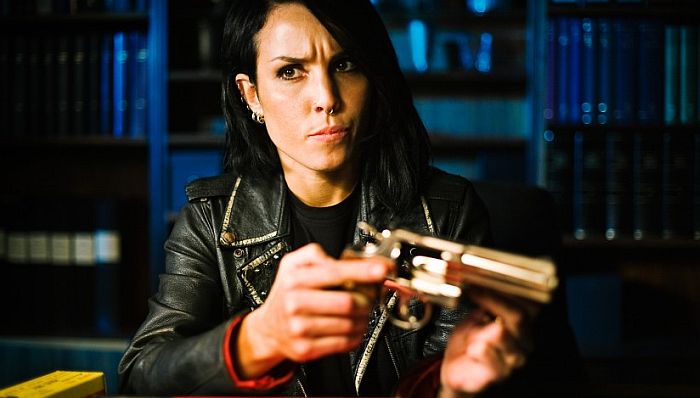 ★★★½
★★★½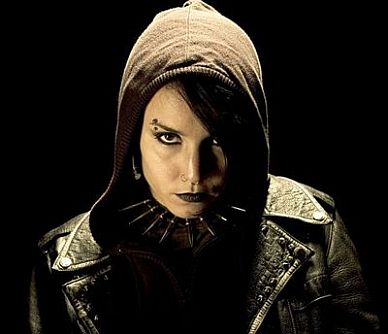 Salander is not your typical action heroine: she’s 5’4″, weighs maybe 90 lbs dripping wet, and anti-social to a degree that may be pathological. But she possesses a mind like a steel-trap, impressive computer hacking skills, a steely resolve and a zero-tolerance policy for anyone who abuses women [the Swedish title of the first book and film translates as “Men Who Hate Women”, and misogyny is something of a theme throughout the trilogy]. This was demonstrated very early: at the age of twelve, and fed up of seeing her father hurt her mother, she doused him in petrol and set him on fire. Like I said: “zero-tolerance”.
Salander is not your typical action heroine: she’s 5’4″, weighs maybe 90 lbs dripping wet, and anti-social to a degree that may be pathological. But she possesses a mind like a steel-trap, impressive computer hacking skills, a steely resolve and a zero-tolerance policy for anyone who abuses women [the Swedish title of the first book and film translates as “Men Who Hate Women”, and misogyny is something of a theme throughout the trilogy]. This was demonstrated very early: at the age of twelve, and fed up of seeing her father hurt her mother, she doused him in petrol and set him on fire. Like I said: “zero-tolerance”.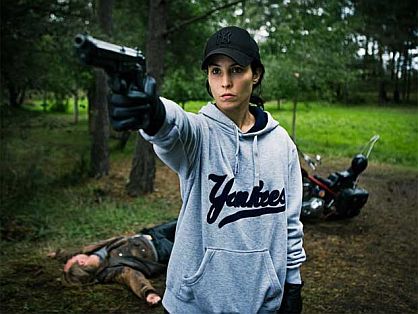 There’s a number of very interesting aspects to the film, such as how Blomkvist and Salander don’t meet until the final scene – I can’t think of many other film where the two central protagonists do that [Heat comes close]. But it’s most memorable for the unstoppable force which Salander has become, utterly fearless, whether it’s taking on a pair of bikers or going into the heart of enemy territory. Even when you think it’s all over for her, she crawls her way back in a way which would make The Bride applaud. It’s curious, yet somehow entirely fitting, to see her as an updated, adult version of another Scandinavian literary and cinematic icon: Pippi Longstocking. Except, to steal a line from Romy and Michelle, she’s like a Pippi who smokes and says “shit” a lot.
There’s a number of very interesting aspects to the film, such as how Blomkvist and Salander don’t meet until the final scene – I can’t think of many other film where the two central protagonists do that [Heat comes close]. But it’s most memorable for the unstoppable force which Salander has become, utterly fearless, whether it’s taking on a pair of bikers or going into the heart of enemy territory. Even when you think it’s all over for her, she crawls her way back in a way which would make The Bride applaud. It’s curious, yet somehow entirely fitting, to see her as an updated, adult version of another Scandinavian literary and cinematic icon: Pippi Longstocking. Except, to steal a line from Romy and Michelle, she’s like a Pippi who smokes and says “shit” a lot. The trilogy of books have sold more than 50 million copies worldwide, though sadly, Larsson didn’t see their success, as he died in 2004, before they were published. The success of the films, which have grossed a total of more than $210 million worldwide – a phenomenal sum for any non-English language series – has led to the inevitable Hollywood remake. Pause for eye-rolling here… Except, the American Tattoo does have David Fincher at the helm, so I’ll wait until seeing it – while, naturally, reserving the right to administer a good kicking in due course. The first pictures of Rooney Mara as Lisbeth (right), don’t exactly inspire confidence, as she looks more like some kind of coked-up fetish supermodel than anything else. Daniel Craig plays the role of Blomkvist, which would seem to make him a bit more glamourous too.
The trilogy of books have sold more than 50 million copies worldwide, though sadly, Larsson didn’t see their success, as he died in 2004, before they were published. The success of the films, which have grossed a total of more than $210 million worldwide – a phenomenal sum for any non-English language series – has led to the inevitable Hollywood remake. Pause for eye-rolling here… Except, the American Tattoo does have David Fincher at the helm, so I’ll wait until seeing it – while, naturally, reserving the right to administer a good kicking in due course. The first pictures of Rooney Mara as Lisbeth (right), don’t exactly inspire confidence, as she looks more like some kind of coked-up fetish supermodel than anything else. Daniel Craig plays the role of Blomkvist, which would seem to make him a bit more glamourous too.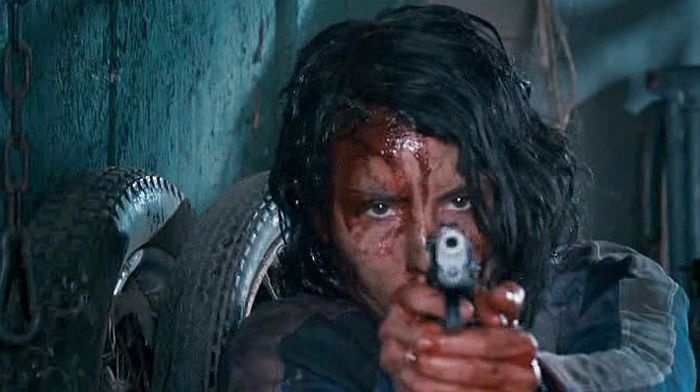
 If the
If the